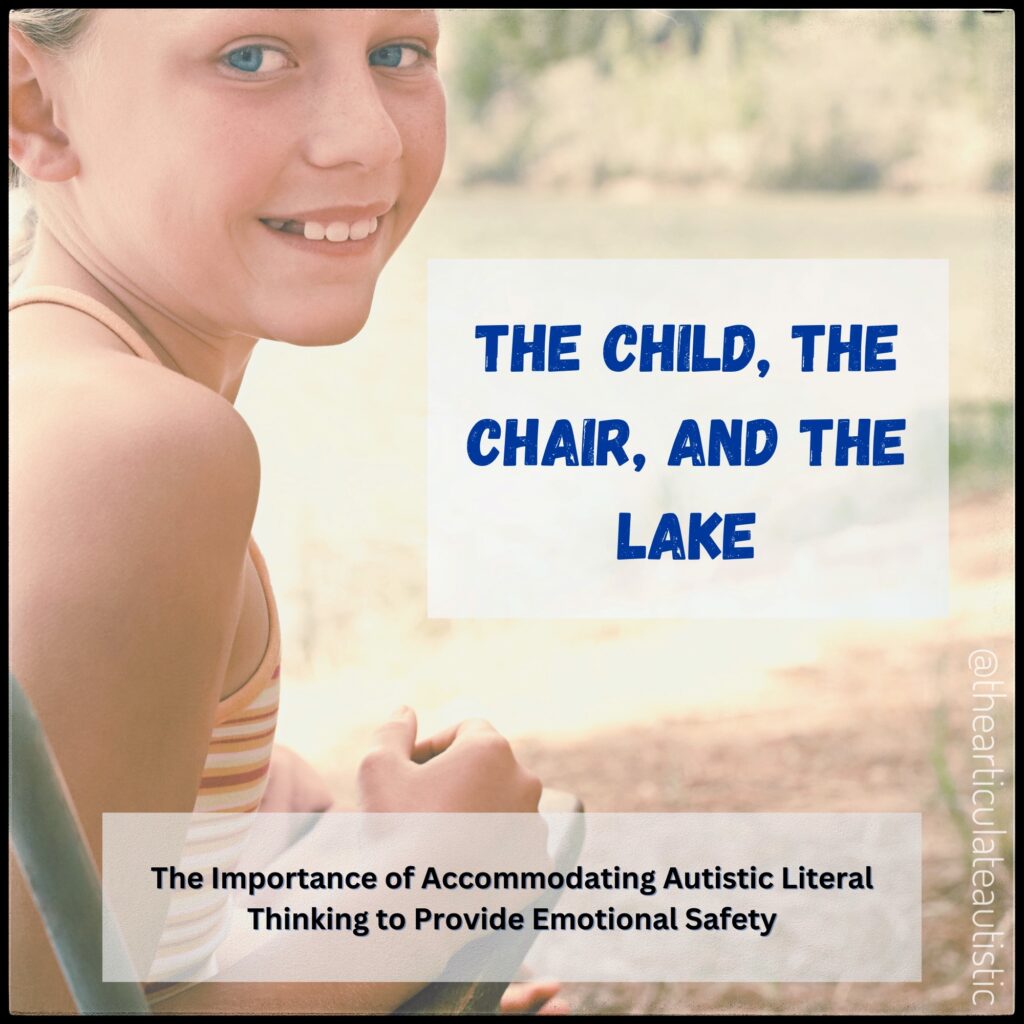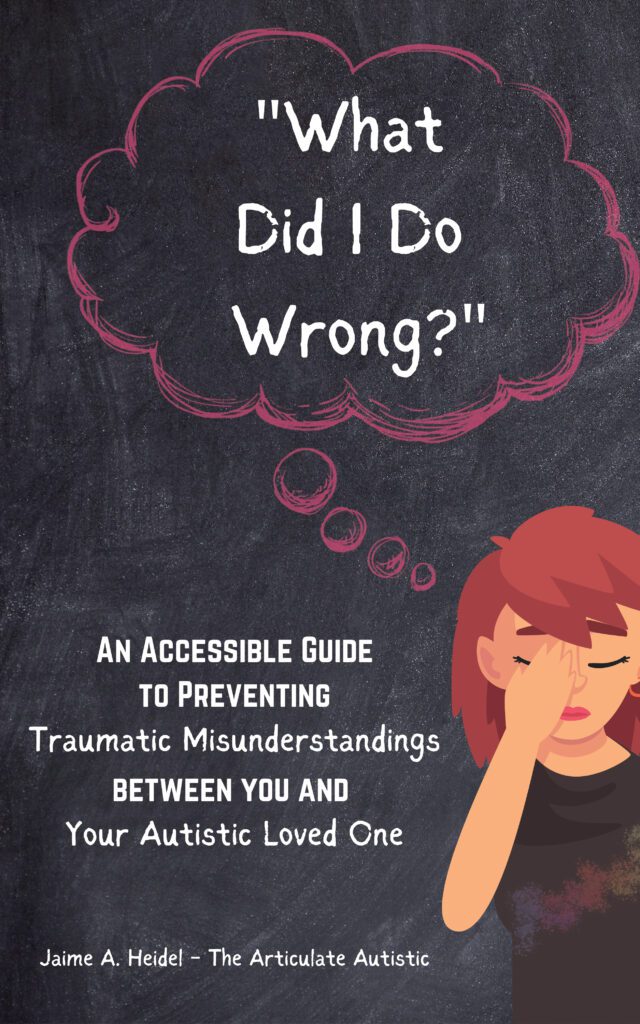The Child, the Chair, and the Lake – The Importance of Accommodating Autistic Literal Thinking to Provide Emotional Safety

I only officially “became” The Articulate Autistic about 4 or 5 years ago, but I recently remembered an incident that happened 20 years ago that gave me a first glimpse into who I would become and what would be important to me–like a preview of sorts.
A friend and I went swimming at a lake on a hot summer day, and we were chatting near the shore. There were only a few other people close by, and one of them was a small family of three. A mother, father, and little girl. The little girl sat in a lawn chair gazing out at the water. Her mom was packing up and told the little girl to come over and bring the chair with her.
The little girl, who was under 10, picked up the chair and carried it over as instructed, but it was bigger than her, so she struggled with it a bit. As she waddled awkwardly over, her parents gaped at her with a mixture of what looked like annoyance and shock.
The little girl set the chair down and stood there, gazing solemnly at her parents as though awaiting further instruction. The mom, finding her voice again, piped up with, “Obviously, I meant fold the chair first and then bring it over here!” While the little girl stood there looking baffled, the mother continued commenting on how ridiculous it was that her daughter carried the chair without folding it first.
The words came out of my mouth before I realized I was even speaking.
“You didn’t tell her to.”
I think the parents were just as surprised as I was that I’d spoken, but I had to. Watching that exchange, something in my young mind was triggered, and I felt fiercely protective of the child. She was me. Standing confused and awkward as she was reprimanded for something she didn’t understand.
I’d never seen it from an outsider’s perspective before.
Is this how I had looked as a child? I wondered. Confused, ashamed, defeated? My lower lip quivering as I desperately tried to keep a stiff upper one?
The mother looked over at me and asked me to repeat myself, and I tried softening my tone as I continued, but I was determined to explain what was going on (despite my friend shooting me worried looks).
Me: “Yeah. You didn’t ask her to fold the chair before bringing it over. You just told her to bring it over to you.”
The Mom: “Shouldn’t she just know?”
Me (shrugging with a smile meant to diffuse whatever situation I’d inadvertently put myself in): “I didn’t. I was just like her when I was little. I needed to be told exactly what to do, or I wouldn’t know to do it.”
The Mom: “Oh, OK. Thanks.”
The mom then proceeds to look at her daughter, look at me, and then go back to packing up. I think I smiled at the little girl, and I think she smiled back gratefully, but my brain might be embellishing that last part. It was, after all, a long time ago.
I suppose the parents could have told me off for what amounted to a stranger telling them how to raise their child, but they didn’t, and I’m grateful for that. They even seemed to take in my message.
I still think about that little girl from time to time. She’d be in her late 20s by now. I hope she’s doing alright. I hope that short exchange between me and her mom helped the parents to understand that their child was just a literal thinker and that maybe they needed to be more specific when giving her instructions.
The Importance of Accommodating Autistic Literal Thinking
As a literal thinker who needs clear, specific instructions, I was told off more times than I can count when I was younger. Family, friends, teachers, co-workers, etc. all thought I was being sarcastic, rude, purposefully obtuse, practicing ‘malicious compliance’ (only learned of that term recently), trying to get out of doing something, or playing ‘dumb’ for attention when I followed instructions exactly.
I wasn’t doing any of those things. I didn’t have any negative or malicious intentions. I’m just a literal, bottom-up thinker whose brain doesn’t easily suss out and respond to subtext. I need specific, clear direction, just like the little girl at the lake.
It wasn’t the fact that my brain worked differently that caused the bulk of my trauma, though, it was the fact that so many of the people around me growing up focused their energy on accusing me of having some “hidden agenda” and punishing me for it instead of noticing a pattern of me taking instructions literally and tailoring their teaching style to meet my needs.
Provide Emotional Safety for Your Autistic Loved One
Being chronically misunderstood and accused of having motives that you’d never even think of let alone actually have simply for having a brain that works differently than the majority can have a significant mental and emotional impact on an autistic person.
I don’t want your autistic loved one to go through what I went through. I want them to experience emotional safety, which is why I wrote the book, “What Did I Do Wrong?”: An Accessible Guide to Preventing Traumatic Misunderstandings Between You and Your Autistic Loved One. Each section features a common autistic trait, what that trait is usually misconstrued as, and the true intentions and meaning behind the trait.
The more you understand how your autistic loved one thinks, perceives, and interacts with the world, the fewer misunderstandings, hurt feelings, and confusion there will be. At first, it will feel a bit like learning a new language, but once you’re fluent in it, speaking literally, providing context, and offering the benefit of the doubt will become second nature to you!
Prevent traumatic misunderstandings and enjoy more effective communication with your autistic loved one. Pick up your copy of “What Did I Do Wrong?” on Barnes & Noble today!




I head an organization that work on the issues adults with autism face. We were that first organization to look at life span issues comprehensively. Your story rings true on so many levels. I would love to talk to you more about your book. I’m ordering it now. My contact is below.
I sent you an email. 🙂